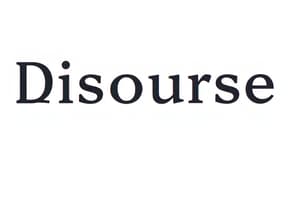Podcast
Questions and Answers
Which type of power is associated with politicians and police?
Which type of power is associated with politicians and police?
- Personal power
- Political power (correct)
- Social power
- Influential power
What does Dale Spender suggest about the generic male language?
What does Dale Spender suggest about the generic male language?
- It reinforces male identity while excluding women. (correct)
- It includes all genders equally.
- It evolves based on societal changes.
- It promotes gender equality.
Which concept relates to how class, gender, and ethnicity can influence power dynamics?
Which concept relates to how class, gender, and ethnicity can influence power dynamics?
- Cultural Capital Theory
- Muted Group Theory (correct)
- Empowerment Theory
- Communication Theory
What type of power is used to influence and persuade others?
What type of power is used to influence and persuade others?
According to Dale Spender, what makes challenging male power difficult?
According to Dale Spender, what makes challenging male power difficult?
Flashcards
Political Power
Political Power
The ability to influence others through position, authority, or role.
Personal Power
Personal Power
Power derived from an individual's occupation, skills, or social standing. It's based on individual attributes and expertise.
Social Power
Social Power
The power that groups hold based on their social position, such as class, gender, ethnicity, or age.
Instrumental Power
Instrumental Power
Signup and view all the flashcards
Influential Power
Influential Power
Signup and view all the flashcards
Study Notes
Wareing (1999)
- Different types of power include political (politicians, police)
- Personal power is related to occupation/role
- Social power is linked to class, gender, ethnicity, and age, potentially related to muted group theory
Different Types of Power Use
- Instrumental power: maintaining and enforcing authority/gaining compliance
- Influential power: influencing and persuading others to act
Spender - Man-Made Language
- Language is created by men, particularly in patriarchal societies
- Language benefits men and operates in their favor
- Language systems order, categorize, and manipulate the world
- Language constructs reality
- Stereotypes and labels about women (disobedient, abnormal, promiscuous, frigid, or neurotic) exclude women and impact their identities.
- Generic masculine pronouns (he/his) exclude women.
- Dale Spender argues language embodies structures that support male power—referencing Zimmerman and West's work. Challenging this male power structure is claimed to be difficult because the way people think is part of and reinforces this power.
Studying That Suits You
Use AI to generate personalized quizzes and flashcards to suit your learning preferences.



